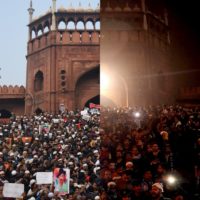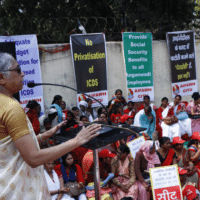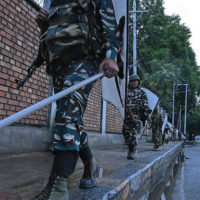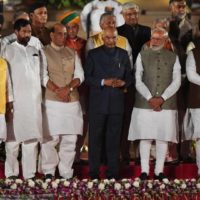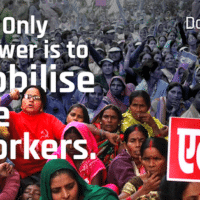-
The COVID-19 debt deluge
How long the COVID-19 crisis will last, and what its immediate economic costs will be, is anyone’s guess. But even if the pandemic’s economic impact is contained, it may have already set the stage for a debt meltdown long in the making, starting in many of the Asian emerging and developing economies on the front lines of the outbreak.
-
How India’s Modi is playing on Trump’s ego to his advantage
One thing about U.S. President Donald Trump is that he can be brutally frank. Trump recently picked up the phone and called British Prime Minister Boris Johnson to convey his displeasure over the latter’s decision to allow Huawei to operate in the UK despite Washington’s repeated urgings.
-
Standing up for Left literature—In India, it can cost you your life
On February 16, 2015, Govind and Uma Pansare went for a morning walk near their home in Pune (Maharashtra, India). Two men on a motorcycle stopped near them and asked for directions, but the Pansares could not help them; one of the men laughed, removed a gun, and shot the two. Uma survived the attack but Govind died in a hospital on February 20, 2015.
-
Dossier 25: People’s Polyclinics: The initiative of the Telugu communist movement
Under the shadow of the Charter of the United Nations (1945) and the Universal Declaration of Human Rights (1948), countries are obliged to guarantee the right to health. The 1946 Constitution of the World Health Organisation (WHO) defines health as ‘a state of complete physical, mental, and social well-being and not merely the absence of disease or infirmity’.
-
Not an inch: Indian students stand against the far-right
With her head bandaged and her arm in a sling, university student Aishe Ghosh went before the cameras to say that the students of the university she attends in New Delhi would move “not an inch back.”
-
Indian workers fight back: 250 million people go on strike
Millions of Indians hit the streets today in support of the general strike and as part of nationwide coalition-building efforts to resist the policies of the right-wing Modi government.
-
Dossier 24: The world oscillates between crises and protests
This dossier is dedicated to offering an assessment of the moment we find ourselves in today. Part 1 provides a quick overview of planetary affairs; and Part 2 there are more detailed reports from our offices on their respective regions: South Africa, India, as well as the Caribbean and Latin America.
-
India’s Government is going to war against its own people
On December 13, the United Nations high commissioner for human rights released a powerful statement that criticized India’s new citizenship law. This “fundamentally discriminatory” Citizenship (Amendment) Act of 2019 would expedite citizenship for persecuted religious minorities from India’s neighboring countries. But in the list of those minorities, it names only Hindus, Sikhs, Buddhists, Jains, Parsis, and Christians.
-
Climate Justice in India: A critical overview
Global climate strike led by Greta Thunberg and youth around the world has trigged climate justice debates in the mainstream. In India, from the past few weeks, we have witnessed climate protests in major metropolitan cities demanding governments to act on the current climate crisis to ensure a livable future for the coming generations.
-
Navigating Educational Empowerment Through Life Conditions: A Study of Rural Women in Indian Punjab
Though the voices of rural women in India are some of the least heard, they are not mere passive victims. Many rural women strongly condemn their marginalization and pauperization—highlighting the flawed and biased developmental polices of the state, which they hold largely responsible for their hardships.
-
Kashmir on the edge of the abyss
Tariq Ali on the situation in Kashmir.
-
History often proceeds by jumps and zig-zags
The main conflict here – since the 1940s – has been between India and Pakistan. Disagreements are deeply rooted in the political culture of each country. The rise of the far right in India has only inflamed the conflict further.
-
Why Kashmir is suddenly a potential global point of conflict
Before India’s Home Minister Amit Shah introduced the Jammu and Kashmir Reorganization Bill in the Indian Parliament, his government sent tens of thousands of Indian troops into Kashmir. There is no official number, but it is often said that there are nearly 600,000 Indian troops in the state. That a population of 12 million people needs this kind of armed action suggests that they are an occupied people.
-
Is India displaying signs of neo-fascism?
Property rights of people are protected under neo-fascism, except those racially, communally, sexually, or politically targeted whose properties are often confiscated.
-
At least 6 people killed in mob lynching incidents in Bihar in past week
Not just that, a dozen more incidents of mob violence have also been reported in which people were attacked, thrashed, injured, abused and humiliated by mobs for alleged crimes or no crimes in some cases.
-
A conversation with Aijaz Ahmad: ‘The state is taken over from within’
Aijaz Ahmad argues that the Rashtriya Swayamsewak Sangh (RSS) and its fronts, including the Bharatiya Janata Party (BJP), display distinct fascistic characteristics, but the Indian state continues to live by the liberal playbook, no matter how hollow the Indian liberal institutions may have become. He anchors this proposition in a distinctive theoretical position.
-
The debate over inequality
The debate over inequality has become hotter world-wide. While Trump had introduced substantial tax cuts for the rich in 2017, and Britain’s Boris Johnson, the front-runner to succeed Teresa May, has promised to do the same if he becomes Prime Minister, there are strong proposals for taxing the rich which have also been mooted. Bernie Sanders had such a proposal for the U.S. during the time that he was seeking the Presidential nomination of the Democratic Party.
-
Religion is the sigh of the oppressed creature
On the one hand, people who spend most of their time working develop an understanding of the ‘practical transformation of the world’. This framework is implicit in the workers’ activity, since the worker–given the theft of their time–is often prevented from having a ‘clear theoretical consciousness of this practical activity’.
-
‘In India, it’s pathological authoritarianism’
That raises a whole range of very familiar and long-standing issues that have afflicted the Left, leading to debates in India (and no doubt in other places as well) between the organised Left and what has come to be called the “ultra-Left” and the insurgent Left.
-
Dossier 18: The only answer is to mobilise the workers
Tricontinental: Institute for Social Research launches its eighteenth dossier, “The Only Answer Is to Mobilize the Workers.” The challenges facing Indian workers and their strategies to fight back are explained through the insights and expertise of K. Hemalata, president of the Center of Indian Trade Unions (CITU).







